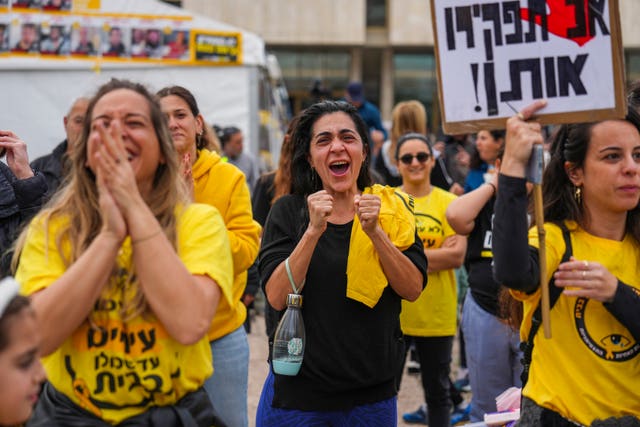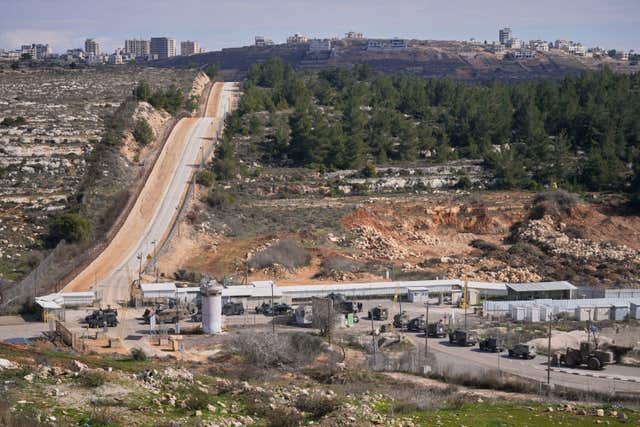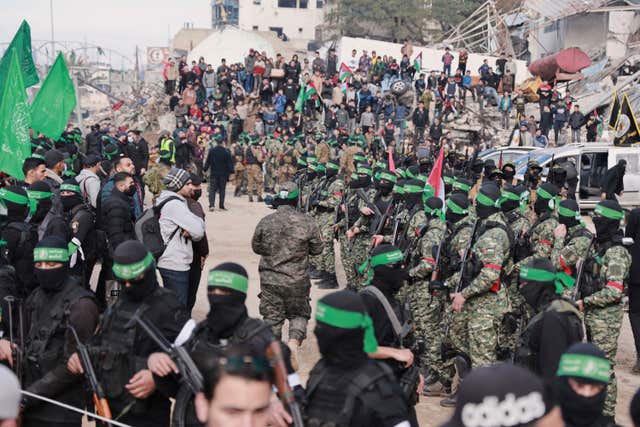Four female Israeli soldiers freed in exchange for 200 Palestinian prisoners
The fragile ceasefire is holding. although it is facing its first crisis as Israel has not allowed Palestinians to return to northern Gaza as agreed.

Four female Israeli soldiers who were taken in the attack that sparked the war in Gaza have returned to Israel after Hamas militants paraded them before a crowd of thousands in Gaza City before handing them over to the Red Cross.
Israel later released 200 Palestinian prisoners in the second such exchange during a fragile ceasefire.
The four Israeli soldiers smiled, waved and gave the thumbs-up from a stage in Palestine Square, with armed, masked militants on either side as Hamas sought to show it remains in control in Gaza after 15 months of war.

Israel’s Prison Service later said it had released 200 Palestinians, including 121 people serving life sentences after being convicted of deadly attacks against Israelis, while others were held without charge.
Thousands of Palestinians in the Israeli-occupied West Bank city of Ramallah celebrated their arrival. Wan-looking and wearing grey prison sweatsuits, some wore Hamas headbands given to them by the crowd and rode on supporters’ shoulders.

As mediators addressed that matter, hundreds of Palestinians gathered near the Netzarim corridor – an east-west road dividing Gaza – waiting to move north.
Israeli forces also shot and killed a Palestinian man close to the Netzarim corridor, Palestinian medical officials said.

It said it was unaware of anyone being harmed, and again warned people not to approach troops.
Israeli Prime Minister Benjamin Netanyahu’s office said Israel would not allow Palestinians to begin returning to northern Gaza until Ms Yehoud, a civilian taken from a kibbutz by Hamas in the attack on October 7 2023, was freed.
Hamas said it held Israel responsible for “any delay in implementing the agreement and its repercussions”.

The US National Security Council continues to push for MS Yehoud’s release, a spokesperson said.
The ceasefire began last weekend and is aimed at winding down the deadliest and most destructive war ever fought between Israel and Hamas. The deal has allowed for a surge of aid into tiny, devastated Gaza.
When the ceasefire started, three hostages were released in exchange for 90 Palestinian prisoners, all women and children.

The four hurried to embrace loved ones. Thousands of people danced and celebrated as the soldiers arrived by helicopter near a Tel Aviv hospital, which described them in stable condition.
A fifth female soldier in their unit, Agam Berger, 20, also was abducted. “Now she’s there alone,” said family friend Yoni Collins.
A video released by Hamas’ armed wing showed the hostages thanking the militants in Arabic for the “good treatment,” again likely under duress.
Israel’s army spokesman Rear Adm Daniel Hagari criticised the “cynical” display by Hamas. He also said Israel is concerned about the two youngest hostages – Kfir and Ariel Bibas – and their mother, Shiri. Kfir Bibas marked his second birthday in captivity this month.

Twenty-six other hostages should be released in the ceasefire’s six-week first phase, along with hundreds more Palestinian prisoners. The next exchange is next Saturday.
What happens after the first phase is uncertain, but many hope it will lead to ending the war that has displaced the vast majority of Gaza’s population and left hundreds of thousands at risk of famine.
The October 7 attack killed some 1,200 people, mostly civilians, and took around 250 others hostage. More than 100 were freed in a weeklong truce the following month. Israel believes at least a third of the 90-plus captives still in Gaza are dead.
The war has killed more than 47,000 Palestinians, according to local health officials, who do not say how many were militants but say women and children make up over half the dead.





